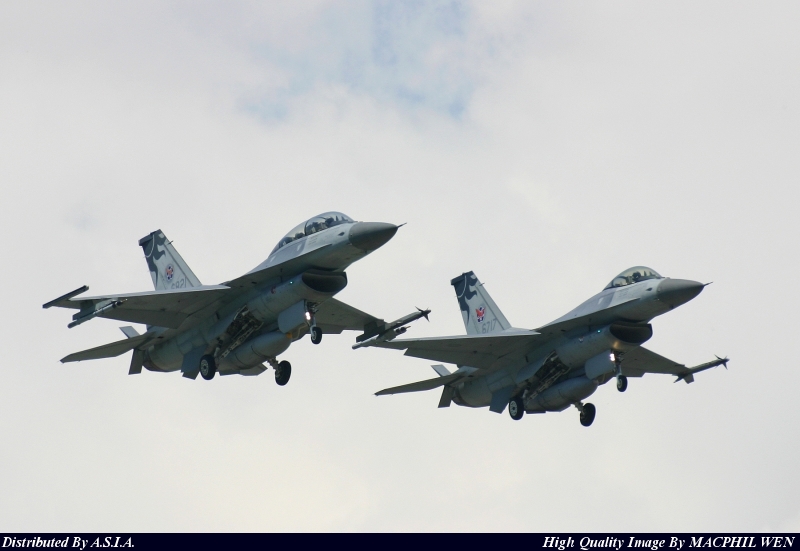Fighter Jet News
F-16 Fighting Falcon News
Taiwan F-5F crash prompts call for purchase of F-16s
June 19, 2006 (by
Lieven Dewitte) -
The fatal crash of a Taiwanese air force twin-seat fighter has sparked concern about the safety of the ageing jets and calls for the island to purchase advanced F-16s from the U.S.

The F-5 crashed into a field in the southern county of Chiayi over the weekend, killing one officer and leaving another critically injured, the defence ministry said.
While the cause of that accident was not immediately clear, officials were quick to point out Taiwan's locally-built Northrop F-5s are over 30 years old, and have been involved in 32 fatal accidents in that time.
Legislators called for the purchase of dozens of US-made F-16 C/D block 50 fighters to replace the F-5 fleet which have been in service for three decades.
In addition to some 60 ageing F-5 Tigers, Taiwan's air force consists of so-called 'second-generation' aircraft - 146 less sophisticated F-16A/B Block 20s, 128 locally produced Indigenous Defense Fighters (IDFs) and 56 French-made Mirage 2000-5s.
Defense ministry spokesman Wu Chi-fang said the air force has drafted short- and long-term acquisition plans. Legislators recommend the air force to purchase 50 to 60 advanced F-16 C/Ds from the United States. The issue was discussed last May when Taiwanese military officers visited Washington.
Since winning a civil war in 1949, the communist authorities in Beijing have viewed self-governing Taiwan as a breakaway province that must be united with the mainland, by force if necessary.
China has repeatedly threatened to invade Taiwan should it move towards formal independence, prompting the island to seek more advanced weaponry.
Under the 1979 Taiwan Relations Act, the United States is committed to help Taiwan defend itself. The act stipulates that the United States will "consider any effort to determine the future of Taiwan by other than peaceful means, including by boycotts or embargoes, a threat to the peace and security of the Western Pacific area and of grave concern to the United States."
This act also requires the United States "to provide Taiwan with arms of a defensive character", and "to maintain the capacity of the United States to resist any resort to force or other forms of coercion that would jeopardize the security, or the social or economic system, of the people on Taiwan." However, it does not necessarily require the United States to take any military action against the PRC in the event of an attack.
The PRC does not recognize the legitimacy of the Taiwan Relations Act as it is viewed by them as "an unwarranted intrusion by the United States into the internal affairs of China."

RoCAF F-16A/B block 20 #6717 & #6821 are coming in for landing at Hua-Lien AFB on May 18th, 2005. [A.S.I.A. Archives Images photo by Macphil Wen]
While the cause of that accident was not immediately clear, officials were quick to point out Taiwan's locally-built Northrop F-5s are over 30 years old, and have been involved in 32 fatal accidents in that time.
Legislators called for the purchase of dozens of US-made F-16 C/D block 50 fighters to replace the F-5 fleet which have been in service for three decades.
In addition to some 60 ageing F-5 Tigers, Taiwan's air force consists of so-called 'second-generation' aircraft - 146 less sophisticated F-16A/B Block 20s, 128 locally produced Indigenous Defense Fighters (IDFs) and 56 French-made Mirage 2000-5s.
Defense ministry spokesman Wu Chi-fang said the air force has drafted short- and long-term acquisition plans. Legislators recommend the air force to purchase 50 to 60 advanced F-16 C/Ds from the United States. The issue was discussed last May when Taiwanese military officers visited Washington.
Since winning a civil war in 1949, the communist authorities in Beijing have viewed self-governing Taiwan as a breakaway province that must be united with the mainland, by force if necessary.
China has repeatedly threatened to invade Taiwan should it move towards formal independence, prompting the island to seek more advanced weaponry.
Under the 1979 Taiwan Relations Act, the United States is committed to help Taiwan defend itself. The act stipulates that the United States will "consider any effort to determine the future of Taiwan by other than peaceful means, including by boycotts or embargoes, a threat to the peace and security of the Western Pacific area and of grave concern to the United States."
This act also requires the United States "to provide Taiwan with arms of a defensive character", and "to maintain the capacity of the United States to resist any resort to force or other forms of coercion that would jeopardize the security, or the social or economic system, of the people on Taiwan." However, it does not necessarily require the United States to take any military action against the PRC in the event of an attack.
The PRC does not recognize the legitimacy of the Taiwan Relations Act as it is viewed by them as "an unwarranted intrusion by the United States into the internal affairs of China."
Related articles:
Forum discussion:
Tags
- Taiwan considers acquisition of 60 US F-16 block 52s (2006-05-17)
- BAE Systems to upgrade radar receiver on Taiwan's F-16 aircraft (2006-02-26)
- Taiwan F-16 combat capability under question (2005-10-31)
- F-16 Fighting Falcon news archive
Forum discussion:
- Start a discussion about this article in the F-16.net forum.
Tags
